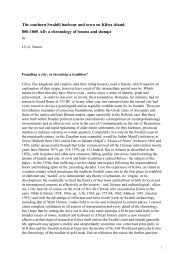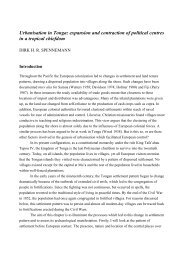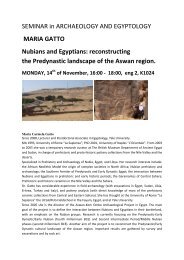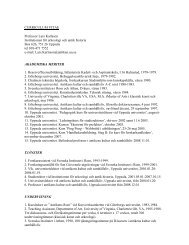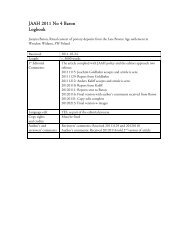Beowulf - Institutionen för arkeologi och antik historia
Beowulf - Institutionen för arkeologi och antik historia
Beowulf - Institutionen för arkeologi och antik historia
You also want an ePaper? Increase the reach of your titles
YUMPU automatically turns print PDFs into web optimized ePapers that Google loves.
the contract the socially dominant person fulfils his part of the goodness contract by<br />
being generous and helpful in negotiations, thus developing his goodness and honour,<br />
while in return the inferior party must perform dangerous and difficult tasks for his<br />
benefactor. The risk is that the beneficiary will be killed, the chance that new gifts, in<br />
effect honour, and later new obligations may be bestowed upon him, until he eventually<br />
reaches the level at which people can be mutually generous, i.e., engaged in a<br />
friendship fruitful for both. Such a state may be personal, but it can also spread out to<br />
a friendship between peoples. Therefore the progression of the friendship between<br />
<strong>Beowulf</strong> and Hroðgar, is the friendship between Danes and Geats. In his<br />
epithalamium Venantius is also aware that this kind of friendship between leaders is a<br />
friendship between nations, since when Athanagild gives his daughter Brunhild to<br />
Sigibert, Venantius sees it as the unification of two kingdoms, but within the aristocracy<br />
male friendship was probably much more important for the development of<br />
friendship between peoples than marriage.<br />
The capability of the individual to act in the name of the people is close to unlimited.<br />
The modern reader may doubt that the individual is defending the cause of the<br />
people rather than his own interests, but it is nonetheless characteristic of the first<br />
poem to Lupus that it starts by comparing Lupus to three of the heroes of the Roman<br />
republic, Cato, Scipio and Pompey, rather than heroic emperors. The good aristocrat,<br />
the foremost being the king himself, bestows care upon everybody, hereby in all<br />
probability honouring an ancient Germanic tradition when the king was elected by<br />
the assembly of free men and represented the people (Thompson 1965).<br />
To balance this obviously advantageous account of the good individual it must be<br />
pointed out that for some heroes the contract seems harsh, e.g., when Byrhtnoth’s<br />
men go forth to die or when the innocent Geat acts as a decoy for Grendel. The<br />
notion of general development and social career is nonetheless very appearent in<br />
<strong>Beowulf</strong>, but also in the rune-stone texts from Jutland and Västergötland. In these<br />
texts it is as easy to be a good þegn as a good drengr, although the old skilled<br />
warriors ought to be fewer than the young ones.<br />
Career and development structure the whole of <strong>Beowulf</strong> (Part I) and it seems<br />
essential to start the career with the unconditional contact between the old man and<br />
the young man or child—Hroðgar and <strong>Beowulf</strong> or Lupus and Venantius, although<br />
Venantius may not have observed how he was about to engage himself. The early<br />
social meeting between two men inaugurates a social, gender-bound fatherhood,<br />
which is a main ingredient in the idea of goodness. This openness and goodness as<br />
the beginning of a fatherhood may also explain why women are not good in the<br />
marked social sense of the Late Iron Age, and why rune-stone sons and especially<br />
fathers are regularly considered good.<br />
As an upper-class role-play goodness involves a combination of logocentric and<br />
martial qualities paired with, or inspired by, generosity. In the initial generosity we see<br />
a reflection of good as a male disposition and a willingness eventually to create a<br />
153



